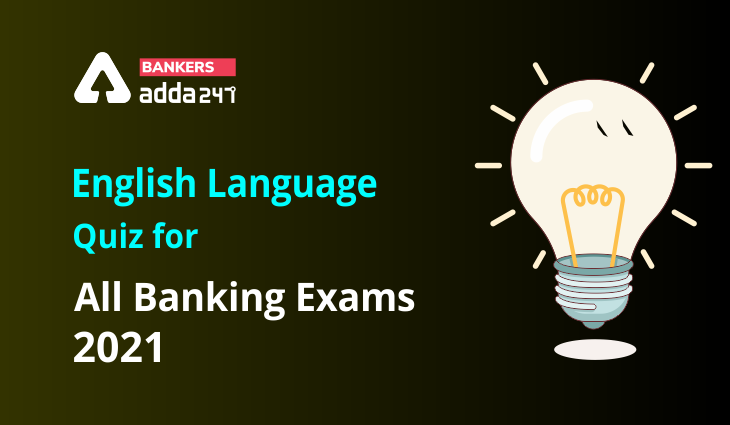
Directions (1-15): Find out the error in each of the following sentences, if there is No error, answer is (e). Ignore the errors of punctuations (if any).
Q1. (a) The reason why investors should / (b) look out further than this next one / (c) or two quarters is because these/ (d) outcomes are totally unpredictable./ (e) No error
(a) a
(b) b
(c) c
(d) d
(e) e
Q2. (a) He was given a / (b) transcript to clarify/ (c) and he never returned / (d) even after repeated calls. / (e) No error
(a) a
(b) b
(c) c
(d) d
(e) e
Q3. (a) When it comes to layoffs, I’d like / (b) to be so respectful as possible, especially/ (c) since face-to-face meetings / (d) aren’t possible right now. / (e) No error
(a) a
(b) b
(c) c
(d) d
(e) e
Q4. (a) Scarcely the steamer had / (b) recovered from the violent / (c) shock than a great mountain of/ (d) water shot up directly in front of the vessel. / (e) No error
(a) a
(b) b
(c) c
(d) d
(e) e
Q5. (a) In this interview, Bett discusses/ (b) the delicate relationship among humans, / (c) wildlife and the pathogens/ (d) that circulate among them. / (e) No error
(a) a
(b) b
(c) c
(d) d
(e) e
Q6. (a) Run fast / (b) lest you will / (c) lose / (d) the race / (e) No error
(a) a
(b) b
(c) c
(d) d
(e) e
Q7. (a) Scarcely we had / (b) reached the office / (c) when it started / (d) raining cats and dogs. / (e) No error
(a) a
(b) b
(c) c
(d) d
(e) e
Q8. (a) Unless you do not meet / (b) all the requirements / (c) your application/ (d) will be rejected. / (e) No error
(a) a
(b) b
(c) c
(d) d
(e) e
Q9. (a) No sooner the teacher / (b) enter the class / (c) than the students/ (d) stood up / (e) No error
(a) a
(b) b
(c) c
(d) d
(e) e
Q10. (a) Bread and butter / (b) is / (c) all we / (d) want. / (e) No error
(a) a
(b) b
(c) c
(d) d
(e) e
Q11. (a) None of the diplomats at the conference / (b) was able either to / (c) comprehend or / (d) solve the problem. / (e) No error
(a) a
(b) b
(c) c
(d) d
(e) e
Q12. (a) The reason why he / (b) was rejected was because / (c) he was /(d) too young. / (e) No error
(a) a
(b) b
(c) c
(d) d
(e) e
Q13. (a) Your success in IAS examinations depends not only on / (b) what papers you have selected / (c) but on how / (d) you have written them. / (e) No error
(a) a
(b) b
(c) c
(d) d
(e) e
Q14. (a) No sooner she had realized / (b) her blunder than she began / (c) to take / (d) corrective measures. / (e) No error
(a) a
(b) b
(c) c
(d) d
(e) e
Q15. (a) He did not / (b) succeed in the examination, / (c) yet he had worked hard and/ (d) had adopted the right strategy / (e) No error
(a) a
(b) b
(c) c
(d) d
(e) e
Also Read:
Solutions
S1. Ans. (c)
Sol. Replace ‘because’ with ‘that’. The phrase ‘the reason why’ is never followed by ‘because’.
S2. Ans. (c)
Sol. In the given statement, we will replace ‘and’ with ‘but’. ‘But’ is used to connect ideas that contrast.
S3. Ans. (b)
Sol. ‘So… as’ is used in negative sense. Use ‘as respectful as’ in this sentence.
S4. Ans. (a)
Sol. Replace ‘scarcely the steamer had’ with ‘scarcely had the steamer’. If ‘hardly, scarcely, barely and no sooner’ are in the initial position, the subject and auxiliary are inverted.
S5. Ans. (b)
Sol. ‘Among’ will be replaced with ‘between’. We use between to refer to two things which are clearly separated. We use among to talk about things which are not clearly separated because they are part of a group or crowd or mass of objects.
S6. Ans. (b)
Sol. ‘Lest’ is followed by ‘should’ and not ‘will’.
S7. Ans. (a)
Sol. Change ‘we had’ into ‘had we’.
S8. Ans. (a)
Sol. ‘Unless’ is not followed by ‘not’. ‘Unless you meet’ will be correct sentence formation.
S9. Ans. (a)
Sol. ‘No sooner’ is followed by ‘a helping verb’ and the ‘sub’. ‘No sooner did the teacher’ will be the correct sentence form.
S10. Ans. (c)
Sol. Add ‘that’ after ‘all’.
S11. Ans. (b)
Sol. In the given sentence comprehend and solve are the two verbs, either must come before ‘comprehend’ because ‘or has been used before ‘solve’. Put ‘either’ after ‘to’
S12. Ans. (b)
Sol. ‘because’ cannot come with ‘the reason why’ because the sentence then becomes superfluous.
S13. Ans. (c)
Sol. ‘But also’ is used together with ‘not only’. Add ‘also’ to ‘but’
S14. Ans. (a)
Sol. ‘Had’ must come after ‘no sooner’ and the subject must follow.
S15. Ans. (c)
Sol. Change ‘yet’ into ‘though’.














